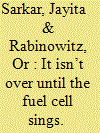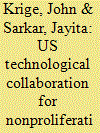| Srl | Item |
| 1 |
ID:
120416


|
|
|
|
|
| Publication |
2013.
|
| Summary/Abstract |
India's relationship with the nuclear non-proliferation regime deteriorated sharply after its 1974 underground nuclear test which, according to India, was a peaceful nuclear explosion, but which was not accepted as such by the regime. That it did not follow up with immediate weaponisation challenged the core logic of the non-proliferation regime which operates on a Murphy's Law of 'nuclear fatalism', i.e. if a country has the know-how to produce nuclear weapons, it will certainly produce them. This article argues that at least until the beginning of its integrated guided missile development programme in 1983, India's nuclear inaction posed a normative challenge to this logic.
|
|
|
|
|
|
|
|
|
|
|
|
|
|
|
|
| 2 |
ID:
158011


|
|
|
|
|
| Summary/Abstract |
Based on newly declassified archival documents, the aim of this study is to contribute to an improved understanding of the evolution of the non-proliferation regime through an examination of US and French nuclear cooperation agreements in the latter half of the 1970s. The four pledges of nuclear assistance examined – US assistance to Egypt and Israel, and French assistance to Pakistan and South Korea – failed to materialise by the end of the decade. Why did that happen? What caused the four pledges to fail? We find that the 1974 Indian nuclear explosion and the emergence of opposing domestic factions on the nuclear front in the supplier states generated major changes in US and French nuclear export policies, and also contributed to the development of a collaborative partnership between the two competing nuclear exporters, on the other.
|
|
|
|
|
|
|
|
|
|
|
|
|
|
|
|
| 3 |
ID:
162682


|
|
|
|
|
| Summary/Abstract |
Although the existing international-relations scholarship argues that technological assistance in the nuclear domain increases the probability of nuclear proliferation, the historical account indicates otherwise. Congressional legislation for nonproliferation, economic sanctions, and poor state capacity—specifically, inept managerial capabilities of the recipient state—explain merely part of the puzzle, but overlook the role of positive inducements offered to impede nuclear proliferation. Historical evidence shows that the United States often provided technological assistance with the deliberate intent to inhibit proliferation. In other words, Washington employed its technological leverage to attain nonproliferation goals. American technological preponderance since the end of World War II made such an approach feasible. This study examines key Cold War cases—Israel/Egypt, India, and West Germany—where the United States offered technological assistance with the deliberate intent to stall nuclear proliferation, thereby underscoring the role of assistance for inhibitive ends.
|
|
|
|
|
|
|
|
|
|
|
|
|
|
|
|